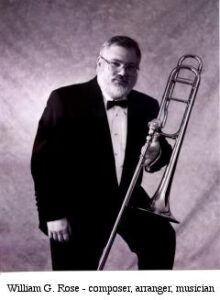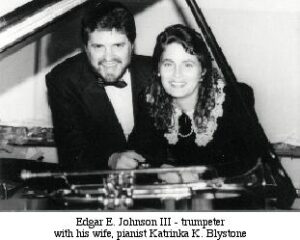Fisher Tull’s compositional style reflects a diverse musical vocabulary ranging from the neo-classical (Toccata, Capriccio, Three Episodes, Concerto for Piano & Wind Ensemble) to the experimental (Studies in Motion, Nonet, Cyclorama I & II) and the programmatic (Reflections on Paris, Chant of the Phoenix). Of particular note is his treatment of the theme and variations concept in many of his works such as Sketches on a Tudor Psalm, Variations on an Advent Hymn, and Fantasia for Flute and Harpsichord. His jazz background, usually suppressed in his compositions, emerges in Colloquy for Saxophone and Percussion and Quodlibet for Brass Ensemble. Religious influences are evident in works such as The Final Covenant, Introit, Credo, Antiphon, The Binding, Liturgical Symphony, and Missa Brevis.
– from the composer’s publicity packet c. 1990
Reviews
“In all these works [Coup de Brass, Sketches for Five Brass, Segments for Eight Trumpets, Tubular Octad], Fisher Tull eschews the use of flashy surface effects in favor of good solid technique, organic evolution of musical ideas, and a high regard for the nature of the brass instruments. These works are musically rather than technically – or even physically! – demanding. They should be welcome additions to an area of literature where ‘grateful’ works are still few and far between.”
– D. Johns, MLA Notes
“Features of his style include much syncopation tossed off by a kaleidoscopic array of instrumental colors, constant embellishment and underlining by the percussion, crisp polytonality scored to segregate the instrumental choirs, a dry, unromantic approach to dissonance, kept at a moderate but constant level, and an exuberant relishing of shattering sonorities, all presented with brash assertiveness. Unlike some composers who write for the band by conceiving string music and then transcribing it for winds in a regretful compromise, Tull’s music is clearly conceived for the timbral resources of the wind ensemble and is scored with flashy effectiveness.”
– Walter Simmons, American Record Guide
“The works performed here are highly serious and sophisticated. Prelude and Double Fugue exhaustively develops two motifs with a wide range of contrapuntal devices. Studies in Motion abandons the customary exploration of melody and rhythm in favor of shifting textures and tonal colors, featuring quasi-aleatoric sections. Cryptic Essay and The Final Covenant have religious and mystical overtones, while Jargon after William Billings cultivates that maverick composer’s affinity for the grotesque and dissonant.”
– M. Meckna, American Record Guide
© 2004 – 2022 Gulf Wind Music




